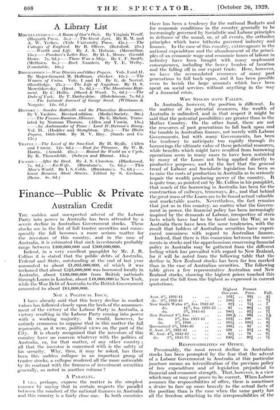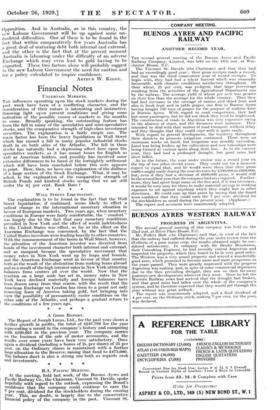Finance-Public & Private
Australian Credit
THE sudden and unexpected advent . of the Labour Party into power in Australia has been attended by a severe decline in Australian Government stocks. These stocks are in the list of full trustee securities and consel quently the fall becomes a more serious matter . for the investors of this country; and in the case of Australia, it is estimated that such investments probably range between £400,000,000 • and 1500,006,000. Indeed, in a very excellent pamphlet by Mr. J.
Collins it is stated that the public debts of Australia, Federal and State, outstanding at the end Of last year amounted to about £1,095,000,000, of which it was reckoned that about 1525,000,000 was borrowed locally in Australia, about £438,000,000 -from British nationals through Loans in London, about £48,000,000 in New York, while the War Debt of Australia to the British Government amounted to about 184,000,000.
NOT A POLITICAL ISSUE.
I have already said that this heavy decline in market values has followed closely upon the heels of the announce- ment of the victory of the Labour Party in Australia, a victory resulting in the Labour Party coming into power with a working majority. It would, however, be entirely erroneous to suppose that in this matter- the fall represents, as it were,- political views on the part of the City. It is clearly recognized that the investors of this country have no concern whatever with the politics of Australia, or, for that matter, of any other country ; all that the investor is concerned with. is the safety of his security. Why, then, At may be asked, has there been this sudden collapse in an important group of trustee stocks, a collapse rendered all the more noticeable by its contrast with the firmness of investment securities generally, as noted in another column?
A PARALLEL.
I can, perhaps, express the matter in the simplest manner by saying that in certain respects the parallel between the conduct of the national finances in Australia and this country is a fairly close One. In both countries there has been a tendency for the national Budgets and for economic conditions in the country generally to be increasingly governed by Socialistic and Labour principles in defiance of the sound, or, at all events, the orthodox principles- which have hitherto governed industry and finance. In the case of this country, extravagance in the national expenditure and the abandonment of the princi- ples of an ecimomic wage and economic hours of labour in industry have been fraught with many unpleasant consequences, including the heavy burden of taxation and the falling off in our export trade. Here, however, we have the accumulated resources of many past generations to fall back upon, and it has been possible even to lavish the large amounts which have been Spent on social services without "anything in the way of a financial crisis.
. WHY STOCKS HAVE FALLEN..
In Australia, however, the position is different. In the matter of its potential 'resources, the wealth. of Australia is unlimited, and in that respect it might be said that the potential possibilities are greater than in the Mother Country, On the other hand, there are not the researces of -past generations to fall back upon and the trouble in Australian finance, not merely with Labour Governments, but with many Governments, has been the tendency "to anticipate too rapidly through' its borrOwings the ultimate value of these potential resources, while benefits which might have resulted from borrowing operations seem in many cases to have been restricted by many of the Loans not being applied directly to productive purposes; and by the fact that the general trend of -Labour and Socialistic, legislation has been so to raise the costs of production in Australia as to seriously impair the wealth producing power of the country. It is quite true, as pointed out by Mr. Collins in his pamphlet, that much of the borrowing in Australia has been for the construction of railways, tramways, &c., and that behind the great mass of the Loans are to be found actual valuable and marketable assets. . Nevertheless, the fact remains that just as in this country, no matter what the Govern- ment in power, the financial policy has been increasingly inspired by the demands of Labour, irrespective of -stern facts which have had to be faced since the War; Sci- in Australia- there have been the same tendencies, with the result that holders of Australian securities have experi- Owed uneasiness with regard to Australian finance.
Indeed, that there is this connexion between the move- ments in stocks and the apprehensions concerning financial policy in Australia may be gathered from the different feeling which has prevailed with regard to New Zealand, for it Will be noted from the following table that the decline in New Zealand stocks has been far less marked than in the case of Australian securities. The following table gives a few representative Australian and New Zealand stocks, showing the highest prices touched this year and the fall from the highest as expressed in current quotations.
Highest Present this year. Price.
Aust. 6% 1931-41 . • • • .. 1031 .. 991
do. 5% 1935-45 1001 .. 93 New South Wales 4% Ins. 1942-62 .. 824 .. 75f do. 41% Ins. 1935-45 .. 92 .. 864 do. 5% 1945-65 .. 1001 .. 921
New Zealand 4% Ins. .. .. .. 100196- .. 991
do. 5% Ins. 1935-45 1031 .. 100 do. 5% 1946 .. .. 1051 .. 1004 Queensland 5% 1940-00 .. • • 1001 .. 92 S. -Aust. 5% 1932-42 .. 100 .. 911
W. Aust. 4% 1942-62 .. • • .. 821 .. 76
do. 5% 1945-75 .. .. • • 1001 .. 921 RESPONSIBILITIES OF OFFICE.
Presumably, the most recent decline in Australian stocks has been prompted by the fear that the advent of a Labour Government in Australia at this particular juncture means an intensification of the previous policy of free expenditure and of legislation prejudicial to financial and economic strength. That, however, is a view which may or may not prove to be correct. When Labour assumes- the responsibilities of offiee, there is sometimes a desire to face up more bravely to the actual facts of the position than is the Rase when the same party has all the freedom attaching to the irresponsibilities of the
• • • • • • • • • • • • • • • • • • • •
Fall. 44 -74 7 54 1114- 3/ 44 84 84 64 71 ' Opposition. And in Australia, as in this country, the new Labour Government will be up against some un- doubted difficulties. One of these is to be found in the fact that within comparatively few years Australia has a great deal of maturing debt both internal and external, and the other is the fact that at the present moment Australia is labouring under the difficulty of an adverse Exchange which may even lead to gold having to be exported. These two factors alone will probably suggest to the new Labour Government the need for caution and for a policy calculated to inspire confidence.
ARTHUR W. KIDDY.



















































 Previous page
Previous page